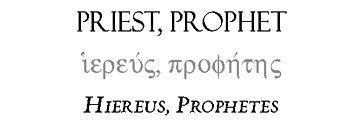From Praying the Names of Jesus Week Twenty-One, Day Three
The Names
Jesus is both Priest — the One who faithfully bears us into God's presence by virtue of his self-sacrifice — and Prophet — the One who perfectly communicates God's Word to us. We are called to listen to him, to trust in his work, and to take our places as part of a kingdom of priests who in Christ Jesus offer ourselves on behalf of others. As you pray to Jesus as both Priest and Prophet, ask him to help you understand the deep meaning of these titles so that you can live out their truths in your life.
Key Scriptures
Therefore, since we have a great high priest who has gone through the heavens, Jesus the Son of God, let us hold firmly to the faith we profess. Hebrews 4:14
In the past God spoke to our forefathers through the prophets at many times and in various ways, but in these last days he has spoken to us by his Son. Hebrews 1:1
***
Wednesday
Praying the Name
When Christ came as high priest of the good things that are already here, he went through the greater and more perfect tabernacle that is not man-made, that is to say, not a part of this creation. He did not enter by means of the blood of goats and calves; but he entered the Most Holy Place once for all by his own blood, having obtained eternal redemption. The blood of goats and bulls and the ashes of a heifer sprinkled on those who are ceremonially unclean sanctify them so that they are outwardly clean. How much more, then, will the blood of Christ, who through the eternal Spirit offered himself unblemished to God, cleanse our consciences from acts that lead to death, so that we may serve the living God! Hebrews 9:11-14
Reflect On: Hebrews 8:7-12; 9:11-14.
Praise God: For giving us a High Priest able to deal decisively with our sins.
Offer Thanks: For the way Christ has cleansed your conscience.
Confess: Any tendency to reject the forgiveness that Jesus offers.
Ask God: To help you begin and end each day with the assurance of his forgiveness.
It has been said that the longest distance in the world is the eighteen inches between the head and the heart. That's the distance that belief has to travel before it becomes part of us. We may know something intellectually but not know it emotionally, in a way that shapes our expectations and behaviors. Maybe that's why so many people have trouble with forgiveness. Some of us refuse to accept it until we've punished ourselves for a while, wallowing in guilt or forging the grim determination to do better even and especially if it kills us.
New Orleans in the summer of 1853 was a frightening place to live. Tar-filled barrels were blazing in the streets. Cannons boomed every twenty minutes in an effort to disperse the putrid winds that were thought to cause disease. People covered their mouths with vinegar soaked cloths and put garlic in their shoes. But these desperate measures did nothing to stop eight thousand people from dying in a yellow fever epidemic. It would be nearly fifty years before researchers would discover that yellow fever is not caused by pestilent air but by biting mosquitoes, and another thirty years before a vaccine would be developed.
From the comfortable perspective of the twenty-first century, setting off cannons to prevent yellow fever seems just shy of ridiculous. But these measures, which must have seemed reasonable at the time, were no further off the mark than our own pathetic efforts to deal with sin our way. Like New Orleans' booming cannons, constant selfrecrimination only adds to our suffering. Sooner than later, our grief over sin should give way to the sense that God still loves us, that he is still merciful, still kind, still forgiving. To fail to receive forgiveness is not a sign of humility but of unbelief. And unbelief is a frightening place to live because it multiplies dangers by acting as a barrier to grace, impeding God's plan for our lives.
Jesus is the great High Priest, whose perfect self-offering has won for us complete forgiveness. In a seventeenth-century graveyard in Manhattan stands a gravestone startling in its simplicity. It contains no name or other distinguishing mark, but only a single word — a benediction that captures what it means for us to belong to Christ. That word is "Forgiven."1 Let us ask the Holy Spirit today to engrave this powerful word not only in our minds but on our hearts so that we can be set free to serve the living God with greater faith and power.
For more from Ann Spangler, please visit her blogspot on Christianity.com. And be sure to check out Ann's newest books on AnnSpangler.com. To hear more from Ann Spangler, sign up today at annspangler.substack.com.
Meet your spiritual ancestors as they really were: Less Than Perfect: Broken Men and Women of the Bible and What We Can Learn from Them.

